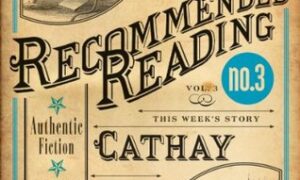 The True Tale of the Monster Billy Dean Telt by Hisself by David Almond
The True Tale of the Monster Billy Dean Telt by Hisself by David Almond
My rating: 3/5 cats



another bleak offering from candlewick, god bless ’em.
to begin—this book is written in the voice of billy dean, a boy who spent the first thirteen years of his life secreted away in the back room of an apartment in a war-torn world, with only three people knowing of his existence: his mother, his priest father, and the woman who delivered him into the world on the very day their town of blinkbonny was bombed. his father, when he bothers to stop by for a visit and a tumble with billy’s mother, fills his head with stories from the bible as well as fairy tales, tries to teach him to read and write with limited success, and this is the extent of his education. as such, the book is written like this:
I wos a secrit shy and tungtied emptyheded thing. I wos tort to read and rite and spell by my tenda littl muther & by Mr McCaufrey the butcha & by Missus Malone and her gosts. So I am not cleva, so please forgiv my folts and my mistayks. I am the won that glares into your harts & that prowls insyde yor deepist dremes.
the insistence on writing this phonetically seems more of an author’s caprice than a real narrative necessity. it just doesn’t seem to ring true, considering how much of billy’s later life involves reading and writing, the number of comparatively difficult words he is able to spell correctly, his intelligence in other areas, and the fact that this book is written many years after the action in the book. it doesn’t read like dyslexia, where there is simply an obstacle to orthography in an otherwise-intelligent individual, this seems like an author trying to reinforce the idea of billy as “other;” as having been so wholly sheltered that his isolation has prevented him from ever being able to absorb the rules of language despite that same isolation somehow not preventing his overdeveloped emotional intelligence.
and i do not have a problem with books written phonetically, or in dialect. some of my favorite books (The Book of Night Women, and And the Ass Saw the Angel, etc) are written this way. so while i understand and appreciate the intention, i just don’t think the decision holds up under scrutiny in this case.
billy’s childhood was spent absorbing stories of death and magic, accepting his small world, being doted on by his mother and alternately roughly loved and savagely berated by his father, who feels guilt over billy’s very existence but sees prophetic import in his having been born the day blinkbonny was bombed and the world changed forever. he keeps searching billy for signs of divine powers, but is frustrated by his seeming inability to learn how to write. for his part, billy is gifted with an endless capacity for love, and he wants nothing more than his father’s love and pride. his world-knowledge is spotty and largely antiquated, so his greatest achievement comes in skinning the mice caught in the room’s traps and drying the skins out into a kind of parchment upon which he writes in his own blood with the feather of a bird who flew through the window into the room and died. when left to his own devices, his play resembles that of a vengeful god—deciding which of his toy animals gets to live through the floods he brings, even when he is unsure of what they are actually called. billy is the center of his own universe, raised on the magic of the old testament, and helplessly desperate to live up to his father’s expectations.
when he is finally brought out into the greater world, it soon comes to light that he does, indeed, have special gifts: the power to channel the dead and the power to heal. in a harsh post-apocalyptic reality, these are magnificent gifts—they bring hope to the survivors and billy becomes known as the “aynjel chylde.”
and things always go well for innocents with messianic powers, right?
in the early scenes, where billy was playing god by himself in his room with his animals, i thought (hoped) this was going to be the junior version of And the Ass Saw the Angel—a dark and powerful story of misconstrued angelic visions leading to operatic destruction. and there are definitely horrible things that happen here, but not because of billy. not directly. billy emerges not the world (seemingly without difficulty or sensory overload, but i guess that’s another one of his gifts) and is nothing but open arms, curiosity, and love. he becomes increasingly horrified by the attention he gets from the services he provides, but he is nothing but benevolent.
and again—no harm ever follows the benevolent.
if you can get past the writing choice, and the unnatural effortlessness of billy’s transition from “boy hidden in room” to “star of the village,” there is a good story here, filled with some very lovely moments. i just didn’t see a whole lot of deeper message on display here, and i was a little disappointed with the ending, which seemed to be more spectacle than story-earned conclusion.
read my book reviews on goodreads







